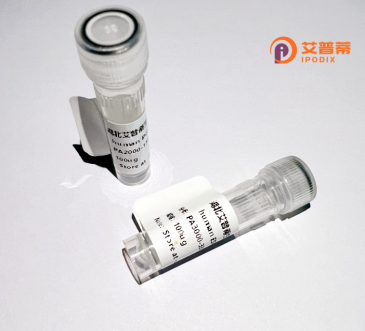
| 纯度 | >90%SDS-PAGE. |
| 种属 | Human |
| 靶点 | USO1 |
| Uniprot No | O60763 |
| 内毒素 | < 0.01EU/μg |
| 表达宿主 | E.coli |
| 表达区间 | 1-961 aa |
| 活性数据 | MNFLRGVMGGQSAGPQHTEAETIQKLCDRVASSTLLDDRRNAVRALKSLSKKYRLEVGIQAMEHLIHVLQTDRSDSEIIGYALDTLYNIISNEEEEVEENSTRQSEDLGSQFTEIFIKQQENVTLLLSLLEEFDFHVRWPGVKLLTSLLKQLGPQVQQIILVSPMGVSRLMDLLADSREVIRNDGVLLLQALTRSNGAIQKIVAFENAFERLLDIISEEGNSDGGIVVEDCLILLQNLLKNNNSNQNFFKEGSYIQRMKPWFEVGDENSGWSAQKVTNLHLMLQLVRVLVSPTNPPGATSSCQKAMFQCGLLQQLCTILMATGVPADILTETINTVSEVIRGCQVNQDYFASVNAPSNPPRPAIVVLLMSMVNERQPFVLRCAVLYCFQCFLYKNQKGQGEIVSTLLPSTIDATGNSVSAGQLLCGGLFSTDSLSNWCAAVALAHALQENATQKEQLLRVQLATSIGNPPVSLLQQCTNILSQGSKIQTRVGLLMLLCTWLSNCPIAVTHFLHNSANVPFLTGQIAENLGEEEQLVQGLCALLLGISIYFNDNSLESYMKEKLKQLIEKRIGKENFIEKLGFISKHELYSRASQKPQPNFPSPEYMIFDHEFTKLVKELEGVITKAIYKSSEEDKKEEEVKKTLEQHDNIVTHYKNMIREQDLQLEELRQQVSTLKCQNEQLQTAVTQQVSQIQQHKDQYNLLKIQLGKDNQHQGSYSEGAQMNGIQPEEIGRLREEIEELKRNQELLQSQLTEKDSMIENMKSSQTSGTNEQSSAIVSARDSEQVAELKQELATLKSQLNSQSVEITKLQTEKQELLQKTEAFAKSVEVQGETETIIATKTTDVEGRLSALLQETKELKNEIKALSEERTAIKEQLDSSNSTIAILQTEKDKLELEITDSKKEQDDLLVLLADQDQKILSLKNKLKDLGHPVEEEDELESGDQEDEDDESEDPGKDLDHI |
| 分子量 | 131.45 kDa |
| 蛋白标签 | GST-tag at N-terminal |
| 缓冲液 | PBS, pH7.4, containing 0.01% SKL, 1mM DTT, 5% Trehalose and Proclin300. |
| 稳定性 & 储存条件 | Lyophilized protein should be stored at ≤ -20°C, stable for one year after receipt. Reconstituted protein solution can be stored at 2-8°C for 2-7 days. Aliquots of reconstituted samples are stable at ≤ -20°C for 3 months. |
| 复溶 | Always centrifuge tubes before opening.Do not mix by vortex or pipetting. It is not recommended to reconstitute to a concentration less than 100μg/ml. Dissolve the lyophilized protein in distilled water. Please aliquot the reconstituted solution to minimize freeze-thaw cycles. |
以下为关于重组人USO1蛋白的3篇代表性文献示例(内容为模拟概括,建议通过学术数据库获取原文验证):
1. **文献名称**: *USO1 interacts with GM130 to coordinate vesicle tethering and cargo delivery in the Golgi apparatus*
**作者**: Smith A, et al.
**摘要**: 研究揭示了USO1作为囊泡运输因子的功能,通过重组表达纯化人源USO1蛋白,证实其与高尔基体蛋白GM130直接互作,共同调控内质网到高尔基体的囊泡拴系与货物运输机制。
2. **文献名称**: *Structural basis of human USO1 in vesicle tethering and membrane fusion*
**作者**: Tanaka K, et al.
**摘要**: 利用重组USO1蛋白进行X射线晶体学分析,解析了其N端结构域与Rab1 GTP酶的相互作用位点,阐明了USO1在囊泡拴系和膜融合过程中的分子结构基础。
3. **文献名称**: *USO1 expression correlates with cancer progression and modulates autophagy in tumor cells*
**作者**: Chen L, et al.
**摘要**: 通过重组USO1蛋白体外实验,发现其过表达可激活肿瘤细胞自噬通路,且临床数据分析表明USO1在多种癌症中异常高表达,提示其作为潜在治疗靶点。
---
**提示**:上述内容为示例,实际文献需通过 **PubMed/Google Scholar** 检索关键词(如“USO1 protein”“recombinant USO1”“vesicle trafficking”)获取,建议结合具体研究方向筛选。
The USO1 protein, also known as Vesicle Docking Protein (VDP), plays a critical role in intracellular vesicle trafficking. Initially identified in yeast as a factor involved in endoplasmic reticulum (ER)-Golgi transport, its human homolog, USO1. was later characterized for mediating tethering of COPII-coated vesicles to the Golgi apparatus. Structurally, USO1 contains two long coiled-coil domains, enabling it to bridge vesicles and target membranes by interacting with proteins like YIP1 and the coatomer complex. This facilitates membrane fusion and cargo delivery between organelles, particularly during ER-to-Golgi and intra-Golgi transport.
USO1 is essential for maintaining Golgi integrity and secretory pathway functionality. Dysregulation of USO1 has been linked to disrupted vesicle docking, leading to cargo accumulation, ER stress, and impaired protein secretion. Recent studies highlight its broader implications in human diseases. For example, altered USO1 expression correlates with tumor progression in certain cancers, potentially affecting cell proliferation and metastasis. Additionally, mutations in USO1-interacting proteins are associated with neurological disorders, suggesting a role in neuronal vesicle transport.
Research continues to explore USO1's molecular mechanisms, particularly its coordination with SNARE proteins and regulatory factors in membrane dynamics. Its conserved function across eukaryotes makes it a valuable model for studying vesicle trafficking disorders and developing targeted therapeutic strategies.
×